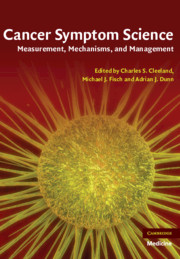Book contents
- Frontmatter
- Contents
- Contributors
- Foreword
- Credits and acknowledgements
- Section 1 Introduction
- Section 2 Cancer Symptom Mechanisms and Models: Clinical and Basic Science
- Section 3 Clinical Perspectives In Symptom Management and Research
- Section 4 Symptom Measurement
- Section 5 Government and Industry Perspectives
- Section 6 Conclusion
- 29 Symptom research: looking ahead
- Index
- Plate section
- References
29 - Symptom research: looking ahead
from Section 6 - Conclusion
Published online by Cambridge University Press: 05 August 2011
- Frontmatter
- Contents
- Contributors
- Foreword
- Credits and acknowledgements
- Section 1 Introduction
- Section 2 Cancer Symptom Mechanisms and Models: Clinical and Basic Science
- Section 3 Clinical Perspectives In Symptom Management and Research
- Section 4 Symptom Measurement
- Section 5 Government and Industry Perspectives
- Section 6 Conclusion
- 29 Symptom research: looking ahead
- Index
- Plate section
- References
Summary
Both cancer and cancer treatment produce multiple, disabling symptoms, the most prominent and distressing of which are addressed in this book. Our aim in assembling this volume has been to balance information from clinical research in cancer-related symptoms, including pain, fatigue, appetite and weight loss, sleep disturbance, cognitive impairment, and cancer-related affective changes, with basic laboratory research that explores, often in animal models, the potential mechanisms responsible for these symptoms.
Several chapters have considered new approaches to studying symptoms, including developing more-pertinent animal models and approaching symptoms from molecular, genetic, and neuroimaging perspectives. Other chapters have focused on issues of symptom assessment by self-report, longitudinal modeling of the relationship between symptom report and biology, and novel clinical trial designs. Finally, several chapters have addressed such real-world issues as obtaining funding for symptom research, establishing the cost-benefit of symptom management, integrating symptom research into collaborative cancer research groups, understanding regulatory guidelines for stating that symptom-relieving drugs really are effective, and exploring pathways for the development of new symptom-management agents. Together, these chapters lend support to the real possibility of a multidisciplinary collaboration that could become a science of symptoms – at least, of symptoms related to cancer.
- Type
- Chapter
- Information
- Cancer Symptom ScienceMeasurement, Mechanisms, and Management, pp. 341 - 348Publisher: Cambridge University PressPrint publication year: 2010



